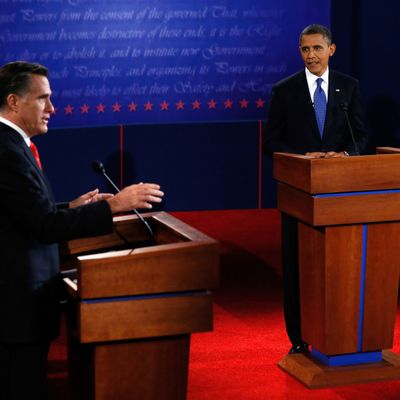
Republicans hoping that Donald Trump benefits from the first presidential debate may be consciously or unconsciously remembering the parallel event in 2012. Held on October 3 in Denver, with a format similar to the one that will be used on Monday, the first 2012 debate was judged by both the “experts” and the public as a win for Mitt Romney that tightened the race, which Barack Obama had been leading for much of the general-election campaign.
Postmortems of the Denver debate focused on two factors: Obama appeared detached and “listless,” and even sort of annoyed at having to be there. Meanwhile, Romney was crisp and responsive, and, without much interference from the incumbent, proceeded to embrace all sorts of moderate-sounding policy positions, presenting a very different image than the endlessly base-pandering ex-centrist of the GOP-nominating contest. In snap polls, Romney was the clear winner, and it seemed to make a big difference in the race, with Gallup reporting the pretty sudden evaporation of Obama’s five-point lead over the Republican.
Subsequently, of course, Obama did a lot better in the second and third presidential debates, and won reelection by a comfortable margin. But looking at the 2012 Romney precedent, could Trump do permanent damage to Clinton by exceeding the very low expectations everyone has of him as a debater, and excite his base into an extraordinary turnout by keeping the race very competitive to the end, while looking more presidential and less extreme in the process?
You never know, but the 2012 Denver precedent does not look that similar in retrospect.
Accounts at the time reported that Obama’s debate prep did not go well at all, which was not that unusual for a candidate who did not like debates and had not done particularly well at such events in the past. He was as unenergetic in rehearsals as in the actual debate, and seemed to disagree with his advisers on how to handle Romney — without, however, insisting on an alternative approach.
By contrast, Hillary Clinton enjoys and usually excels at debating. Her own prep for the first debate with Trump has been complicated by uncertainty about how the mogul would approach the contest, but there have not been reports of any big arguments or crises. And she is being guided by the prep team of Ron Klain and Karen Dunn, who are often credited for helping turn Obama’s debate performance around after Denver.
By contrast, Hillary Clinton enjoys and usually excels at debating. Her own prep for the first debate with Trump has been complicated by uncertainty about how the mogul would approach the contest, but there have not been reports of any big arguments or crises. And she is being guided by the prep team of Ron Klain and Karen Dunn, who are often credited for helping turn Obama’s debate performance around after Denver.
And speaking of Denver, the legend of Romney’s success in that first debate was a bit overblown. On the very morning before that event, Nate Silver pointed out that challengers almost invariably do better than incumbents in initial presidential debates. That is because they are less well-known. It is much less clear that advantage will accrue to Trump, who was a major pop-culture figure before he ran for president and then consistently earned massive media attention. As for Romney’s “shift to the center,” which many Trump supporters would love to see him execute, subsequent analysis indicated that he was not actually perceived any differently after the debates, mainly because most general-election swing voters were not paying attention to the conservative pander-fest he conducted during the primaries. In Trump’s case, the very real perceptions of his extremism will be harder to shake, if only because they are based not just on policies but on his very persona along with the behavior of his fans.
On the other hand, while Romney did a lot better in Denver than most observers expected, he did not benefit from the kind of deliberately lowered expectations that Team Trump has worked to create, all but mocking him (as my colleague Jonathan Chait has hilariously observed) as someone who cannot maintain the attention-span necessary for even the most minimal debate prep. With by far the largest debate audience in history expected, working the refs could have an unusually rich payoff for the perceived “winner.” But the race is going to have to wind up being very close for a single debate to really matter. In the end, it did not in 2012.






























